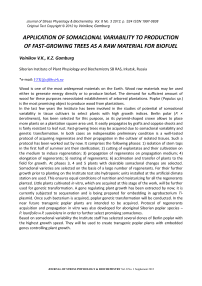Application of somaclonal variability to production of fast-growing trees as a raw material for biofuel
Автор: Voinikov V.K., Gamburg K.Z.
Журнал: Журнал стресс-физиологии и биохимии @jspb
Рубрика: Supplement
Статья в выпуске: 3 т.8, 2012 года.
Бесплатный доступ
Biofuel, poplar, regenerants, propagation, somaclonal variability, clones, growth speed
Короткий адрес: https://sciup.org/14323641
IDR: 14323641
Текст статьи Application of somaclonal variability to production of fast-growing trees as a raw material for biofuel
Siberian Institute of Plant Physiology and Biochemistry SB RAS, Irkutsk, Russia
Wood is one of the most widespread materials on the Earth. Wood raw materials may be used either to generate energy directly or to produce biofuel. The demand for sufficient amount of wood for these purposes necessitated establishment of arboreal plantations. Poplar ( Populus sp. ) is the most promising object to produce wood from plantations.
In the last few years the Institute has been involved in the studies of potential of somaclonal variability in tissue cultivars to select plants with high growth indices. Berlin polar ( P. × berolinensis ), has been selected for this purpose, as its pyramid-shaped crown allows to place more plants on a plantation square area unit. It easily propagates by grafts and coppice shoots and is fairly resistant to leaf rust. Fast-growing trees may be acquired due to somaclonal variability and genetic transformation. In both cases an indispensable preliminary condition is a well-tested protocol of acquiring regenerates and their propagation in the cultivar of isolated tissues. Such a protocol has been worked out by now. It comprises the following phases: 1) isolation of stem tops in the first half of summer ant their sterilization; 2) cutting of explantates and their cultivation on the medium to induce regeneration; 3) propagation of regenerates on propagation medium; 4) elongation of regenerants; 5) rooting of regenerants; 6) acclimation and transfer of plants to the field for growth. At phases 3, 4 and 5 plants with desirable somaclonal changes are selected. Somaclonal varieties are selected on the basis of a large number of regenerants. For their further growth prior to planting on the Institute test site hydroponic units installed at the artificial climate station are used. This ensures equal conditions of nutrition and moisturizing for all the regenerants planted. Little plants cultivated in vitro , which are acquired at this stage of the work, will be further used for genetic transformation. A gene regulating plant growth has been extracted by now; it is currently subjected to sequenation and is being prepared for embedding in agrobacterium Ti -plasmid. Once such bacterium is acquired, poplar genetic transformation will be conducted. In the near future transgenic poplar plants are intended to be acquired. Protocol of regenerants acquisition and propagation in vitro was also developed for aboriginal Siberian poplar species – P. laurifolia и P. suaviolens in order to further select promising somaclones.
Based on somaclonal variability the Institute staff has selected several clones of Berlin poplar with the highest growth speed. They will be used to create transgenic poplar plants with embedded genes controlling plant growth.
JOURNAL OF STRESS PHYSIOLOGY & BIOCHEMISTRY Vol. 8 No. 3 Supplement 2012


